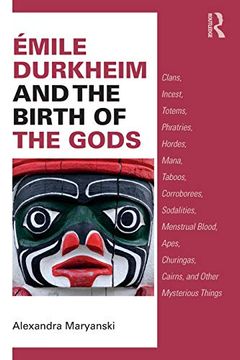Compartir
Émile Durkheim and the Birth of the Gods: Clans, Incest, Totems, Phratries, Hordes, Mana, Taboos, Corroborees, Sodalities, Menstrual Blood, Apes, Churingas, Cairns, and Other Mysterious Things (en Inglés)
Alexandra Maryanski (Autor)
·
Routledge
· Tapa Blanda
Émile Durkheim and the Birth of the Gods: Clans, Incest, Totems, Phratries, Hordes, Mana, Taboos, Corroborees, Sodalities, Menstrual Blood, Apes, Churingas, Cairns, and Other Mysterious Things (en Inglés) - Alexandra Maryanski
Religión y espiritualidad
$ 177.311
$ 272.787
Ahorras: $ 95.475
Elige la lista en la que quieres agregar tu producto o crea una nueva lista
✓ Producto agregado correctamente a la lista de deseos.
Ir a Mis Listas
Origen: Estados Unidos
(Costos de importación incluídos en el precio)
Se enviará desde nuestra bodega entre el
Viernes 12 de Julio y el
Martes 30 de Julio.
Lo recibirás en cualquier lugar de Colombia entre 1 y 5 días hábiles luego del envío.
Reseña del libro "Émile Durkheim and the Birth of the Gods: Clans, Incest, Totems, Phratries, Hordes, Mana, Taboos, Corroborees, Sodalities, Menstrual Blood, Apes, Churingas, Cairns, and Other Mysterious Things (en Inglés)"
The Birth of the Gods is dedicated to Durkheim's effort to understand the basis of social integration. Unlike most social scientists, then and now, Durkheim concluded that humans are naturally more individualistic than collectivistic, that the primal social unit for humans is the macro-level unit ('the horde'), rather than the family, and that social cohesion is easily disrupted by human self-interest. Hence, for Durkheim, one of the "gravest" problems facing sociology is how to mold these human proclivities to serve the collective good. The analysis of elementary religions, Durkheim believed, would allow social scientists to see the fundamental basis of solidarity in human societies, built around collective representations, totems marking sacred forces, and emotion-arousing rituals directed at these totems. The first half of the book traces the key influences and events that led Durkheim to embrace such novel generalizations. The second part makes a significant contribution to sociological theory with an analysis that essentially "tests" Durkheim's core assumptions using cladistic analysis, social network tools and theory, and data on humans closest living relatives―the great apes. Maryanski marshals hard data from primatology, paleontology, archaeology, genetics, and neuroscience that enlightens and, surprisingly, confirms many of Durkheim’s speculations. These data show that integration among both humans and great apes is not so much group or kin oriented, per se, but orientation to a community standing outside each individual that includes a sense of self, but also encompassing a cognitive awareness of a "sense of community" or a connectedness that transcends sensory reality and concrete social relations. This "community complex," as Maryanski terms it, is what Durkheim was beginning to see, although he did not have the data to buttress his arguments as Maryanski is able to do.

